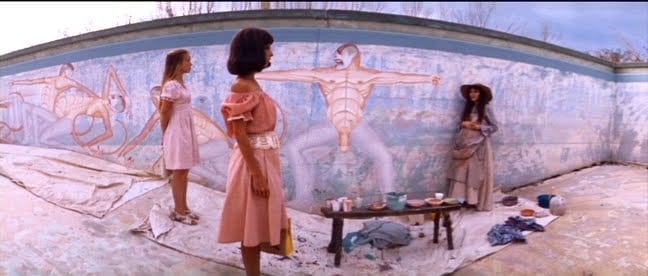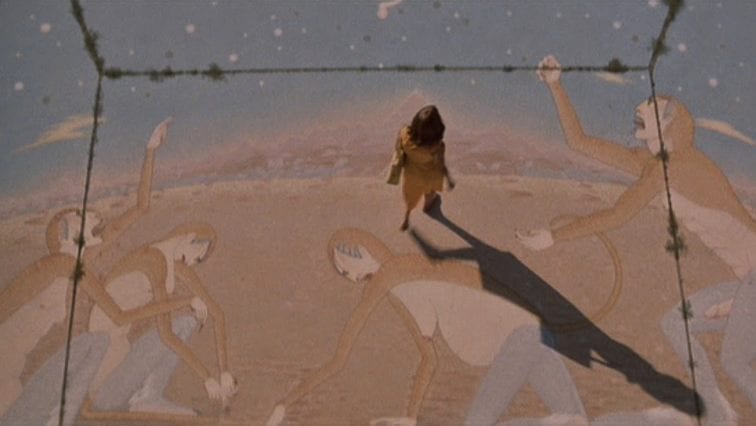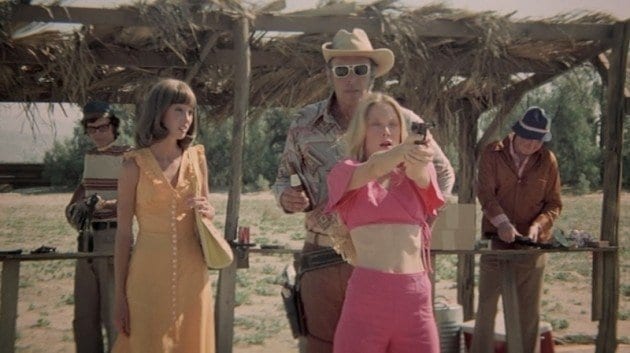The late Robert Altman (Nashville, Short Cuts) is one of the greatest filmmakers of all time. Throughout his half-century-long career, he made truly unique idiosyncratic American cinema. Like his friend David Lynch (Twin Peaks, Eraserhead), Altman was an artist—the camera was his brush. Many of his films, like Nashville (1975), were sprawling interwoven films stuffed with colorful characters and revolving storylines. These films were able to drive home something about the human condition and its function in modern American life like no other director before or since; that doesn’t describe the entire scope of every film in Altman’s oeuvre. 3 Women (1977) is an intimate and sometimes unsettling film largely about the concept of identity. Robert Altman’s film studies identity as an ever-shifting, fluid concept that is both mesmerizing, beautiful and sometimes terrifying to watch.
The three titular women in question are expertly played by Sissy Spacek (Mildred “Pinky” Rose), Shelley Duvall (Mildred “Millie” Lamoreaux), and Janice Rule (Willie Hart). In a vast desert California backdrop, Altman’s 3 Women creates a tone of infinite isolation; California feels more like someone’s version of it in a dream. The entire film actually feels like a dream from the very start and it could be (and has been) argued that it is. Just as interesting are the shifting characters and archetypes that each woman embodies during different segments of the film. Fans of Lynch’s Mullholland Drive (2001) should definitely give 3 Women a viewing. It employs the same type of dream logic and shifting identities that leave the viewer uneasy and without a firm footing. 3 Women was avant-garde, even for Robert Altman; it won the famed Palme d’Or at Cannes in 1977 but was never released on home video until 2004.

The movie begins with Pinky (Sissy Spacek) starting a new job and a new life at a senior citizens rehabilitation facility in California. Just by chance, the center’s supervisor asks Millie (Shelley Duvall) to show her the ropes of the job. Millie needs a roommate and Pinky needs a place to stay; before long the two are roommates. Willie (Janice Rule) is a background mystery for most of the film. One prevalent theory is that the entire film is Willie’s dream.
When 3 Women opens, Willie is painting very unusual and disturbing murals inside the rehabilitation facility. The same murals are seen in every set piece throughout the rest of the film—whatever action is happening in the film at any location. Willie is usually in the background painting the same unsettling murals. They are in the bottom of the pool at the apartment complex where Millie and Pinky live together, as well as the hospital and the tavern/shooting range “Dodge City” that she runs with her cheating husband Edgar. Willie is pregnant, but no one seems to barely acknowledge her in any way—especially Edgar. The entire world in the film seems to be Willie’s, so it’s not hard to put forward the theory that the entirety of the film is one long fever dream exposing her deep-seated anxieties.

The personality shifting and the long slow takes of 3 Women immediately draw comparisons to Mulholland Drive. The majority of the film’s runtime focuses on the ever-shifting relationship between Pinky and Millie. Pinky is an extremely timid girl from Texas who is immediately enamored with Millie from their first meeting at work. Millie is the exact opposite of Pinky; she is an absolute chatterbox, always filling any nanosecond of silence with talks of the latest social trends that she obsesses over consumer compulsions and trendy new recipes that she picks up in her spare time. Just like Willie, no one ever seems to pay Millie much notice. She always walks just behind the other girls at work and despite her non-stop talking is barely ever acknowledged.
Pinky is very shy and doesn’t seem to have any kind of sexual interest in men. On the flip side, Millie is always looking to meet and find new dates. Instead of eating with the other girls at work, Millie pays extra every day to eat across the street at a nearby hospital to try to pick up a man and is always going out to the shared pool in her complex to make friends or hopefully get dinner with one of the neighbors—it’s not entirely sexual. Millie is also trying to make friends and be included in a social circle that is constantly shunning her. The film suggests that Millie doesn’t really notice that everyone is always either ignoring her or making fun; there are moments when characters groan at her presence.

Millie isn’t stupid though and to treat her as such would be unfair. She knows deep down what people think of her, but it doesn’t stop her from constantly trying to seek their approval and acceptance. Pinky is an impossible person to nail down when it comes to her identity. She’s a mystery from the start as the small town girl moved to the big city, but after moving in with Millie she begins to slowly steal aspects of Millie’s personality. It starts off with little things like wearing Millie’s clothes without permission. She steals Millie’s diary and the more she reads the more she begins to talk, sound, and act like Millie. It never goes full Single White Female (1994), but 3 Women is definitely playing with some of the same things in a more meaningful, poetic way. Much like David Lynch’s work, there are no easy answers to be found here.
In the first act of the film, Millie is the mother figure and Pinky is like her child. If the whole film is the pregnant WIllie’s dream, then it can be viewed that both Pinky and Millie are different visions of Willie’s unborn child thrust in a cruel world with uncaring men. Millie and Pinky really are quite isolated. Millie does her best to be a social animal, but it’s eventually soul-crushing to see her constantly ignored and overlooked. Everything changes, including the characters’ identities, in one dark night of the soul. Tensions have been rising between Millie and Pinky. Millie has her hands full with Pinky, beyond frustrated acting as her mother figure. Pinky can be quite child-like, socially backward and trying in Millie’s defense. It’s also unclear at this point what Pinky’s intentions even are.
During the aforementioned dark night of the soul that acts as the turning point in the film, Millie blames Pinky for being ditched by her old roommate and some friends after working hard all day preparing a planned dinner party. It’s a huge deal to Millie, but in the end, she’s blown off without a word to her face. They catch Pinky in the parking lot and just tell her to deliver the message and maybe they’ll see her at Winnie and Edgar’s bar later. It’s a breaking point for Millie and the only person there to scream at is Pinky—so she does. Pinky’s social shyness is blamed for the night and Millie storms out to go catch up with them.
Late that night, to Pinky’s utter shock and dismay, Millie comes home drunk with Willie’s husband Edgar. Pinky begs her not to sleep with him, but Millie kicks her out of the apartment instead. Pinky walks out onto the balcony and attempts to commit suicide. She dives into the pool stories below. Willie just happens to be there adding credence to the theory that this is all her dream yet again. She saves her from the water, but Pinky is in a coma.

That’s when identities start to shift. Millie is devastated and blames herself. While Pinky is in the coma Millie’s personality begins to change in an organic way. She becomes less self-involved and concerned with bullshit social circles that don’t accept her in the first place and becomes genuinely concerned with Pinky. More red flags abound as Millie is told by her work supervisor that Pinky used Millie’s social security card on her initial application. Both Millie and Pinky also share the first name Mildred, but neither go by it. Your feet really start to leave the ground as Altman starts casting doubt on who is who in a variety of ways that create a general sense of uneasiness and dread that is quite similar to a Lynchian tone.
Pinky wakes up a completely different person. She’s crass, sexual, and outgoing; she also has an extreme dislike for the nickname Pinky and insists on being called by her birth name Mildred. It’s reminiscent of watching a parent spar with a teenager who suddenly seems like an entirely different person. The doctors say it’s just temporary amnesia that will wear off, but Pinky is acting more and more dangerous and erratic. Millie, on the other hand, is busy chasing her around like a daughter who has gotten into guns, drugs, drinks, and men. Pinky has and wants nothing to do with Millie and her incessant nagging—where she once had idolized her. She is truly abhorrent toward her and writes in her diary that she’s hoping that Millie will move out soon. Willie is still in the background painting and watching the events unfold with a forlorn presence. Again, if 3 Women is Willie’s dream then we can assert that she is dreaming of potential problems and fears for her unborn child.

Perspectives shift yet again at the end of the film in another even darker night of the soul than the night that put Pinky in a coma. Roles are completely reversed this time around as it’s Pinky who brings home Edgar for sex after a day out drinking and shooting guns. Those are two things that pre-coma Pinky never would have been doing. Millie begs and pleads in the exact same way that Pinky had beg and plead with her before. Finally, when Edgar casually says Willie is back home giving birth does Millie finally assert herself and manage to take an alarmingly bemused Pinky with her to help Willie. 3 Women is not a horror film, but the scene at Willie’s is an absolute horror show and one of the best performances of Shelley Duvall’s career.
Willie’s baby is stillborn, her ultimate underlying fears being realized. Millie is the one that goes in and helps Willie through labor and discovers that the baby is dead. Pinky just stands outside like an empty body waiting to be filled with a new personality. When Millie comes out shaking, covered in blood, she screams and attacks Pinky. Millie demands to know why she didn’t come and help before collapsing in a ball of tears as the scene fades. If the film ended here it would be a much bleaker message but the next scene acts as a coda to the events of 3 Women and sees yet another final personality shift between Willie, Millie, and Pinky. They all live together at the bar/shooting range and in a quick conversation with a mailman, we learn that Edgar has been dead for some time from a gun accident. Something tells me that if it actually was an accident, it was the rare divine one.
Millie has become the mother figure of the three. She dresses like Willie and has adopted her mannerisms. Pinky calls her mama when Millie announces to them both that dinner is ready. Pinky is definitely back to her old self, but happier and more self-assured. The women all walk to the house that once belonged to Edgar and Willie behind their bar to sit down and have a meal together, finally having embraced an identity that made sense to all of them, being a family.
Robert Altman’s 3 Women, despite winning the Palme d’Or at Cannes and being one of the best-reviewed films of the late ’70s, was sadly almost lost forever to time. It wasn’t until fifteen years ago that Criterion finally released it on home video. 3 Women is an uncategorizable film to an extent; it’s wildly open to interpretation. There’s even another argument that the second half of the dream is a dream within a dream itself. Robert Altman even confirmed that the film’s inception came from a dream about making a film like 3 Women. So, who exactly is the dreamer then? As we learn time and time again, just about everyone.



3 WOMEN kicks ass!! I’m one of the few hardcore supporters/obsessive fanboy/pushers of this particular Altman film from waaay back when it was little-seen and even littler-regarded! I’ve been ranting and raving and showing it to anybody who’d listen since like 1984… 3 WOMEN and SUSPIRIA have been my two favorite films since I was just a shitty little tyke, and I’ve been worshipping them both and turning people onto them since way back, so, as you mentioned in your above appreciation, imagine my complete disbelief as we fast-forward almost forty years right up to our current year (2021) and suddenly… both of my motion picture bitches have suddenly become two of the most famous and consistently well-reviewed obscure titles of 70s art cinema, both were released by 20th Century-Fox in 1977, as you may know!! I can’t help but wonder (yeah, and I DO KNOW that there’s no possible way I could ever be as powerful, influential and educational as the internet is) weather or not I personally might have actually contributed in some small way or another, to the overwhelmingly positive contemporary response and elevated status that those two films have achieved and enjoyed, particularly in the last decade or so! Stranger things have happened, Shirley!! I’m only saying, just maybe I somehow did have something to do with their popularity contestant like, clique-ish impactfulness aand timeless longevity!!
Michael not Michasel.
I’m a big Altman fan, so much so that I drove through three states to get to Ann Arbor, Michigan, when Altman premiered a partial cut of the not-yet-released THREE WOMEN. (I seem to recall he was also producing and directing an opera at U. Michigan at the time, in the middle of a spectacular film career.) Love the reading here of a film that merits much wider and more serious attention than it’s received thus far. Only one correction, which I’m sure fans of director Paul Thomas Anderson have already noted, MAGNOLIA is not Altman’s, although few would question Altman’s influence on Anderson, something PTA himself has acknowledged I believe.
Really appreciate the words and I have no idea how I did that but I’m really glad you caught it. I guess I was thinking of PTA and that bled over into my brain. Either way, thanks a lot! Big momentary lapse of brain power there!